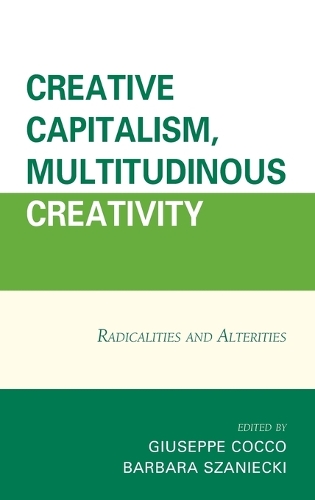
Creative Capitalism, Multitudinous Creativity: Radicalities and Alterities
(Hardback)
Publishing Details
Creative Capitalism, Multitudinous Creativity: Radicalities and Alterities
By (Author) Giuseppe Cocco
Edited by Barbara Szaniecki
Contributions by scar Garca Agustn
Contributions by Sarita Albagli
Contributions by Emiliana Armano
Contributions by Eeva Berglund
Contributions by Yann Moulier Boutang
Contributions by Kristin Carls
Contributions by Bruno Cava
Contributions by Giuseppe Cocco
Bloomsbury Publishing PLC
Lexington Books
20th August 2015
United States
Classifications
Professional and Scholarly
Non Fiction
Political science and theory
International relations
Globalization
330.9
Physical Properties
Hardback
288
Width 161mm, Height 236mm, Spine 28mm
558g
Description
The book aims to counter the normative functioning of creativity in contemporary capitalism with a plethora of alternatives to radical creative practices. In the first part, titled Creative Capitalism, five authors analyze the forms of contemporary capitalism: on the one hand, there are new ways of working which include flexibility, mobility, and especially precarity; on the other, there are new forms of recovery and accumulation. In the second part, titled Multitudinous Creativities: Radicalities and Alterities, the book reflects on more autonomous creative experiments in the world. The third part, titled "Creativity, New Technologies, and Networks", analyses the issues related to the work of creative capitalism and the possible resistance within the digital and collaborative platforms.
Reviews
Focusing a broad range of examples from the realms of social imagination and precarious cultural work, Creative Capitalism, Multitudinous Creativity is a translocal companion to creative and other commons. The book displays that with every piece of creativity sucked by machinic capitalism, countless new lines of invention are emerging as contemporary multitudinous radicality. -- Gerald Raunig, European Institute for Progressive Cultural Policies
The excellent essays in this collection analyze how creativity functions both with and against contemporary capitalism: how "creative work" configures new forms of domination and how creativity animates anticapitalist protest repertoires. In the course of the essays also emerges a fascinating dialogue between European and Latin American perspectives to demonstrate the extent to which creative capitalism looks and functions differently across the North / South divide. -- Michael Hardt, Duke University
Author Bio
Giuseppe Cocco is professor of political theory at the Federal University of Rio de Janeiro (UFRJ). Barbara Szaniecki is professor in the faculty of design at the Superior School of Industrial Design, State University of Rio de Janeiro.
